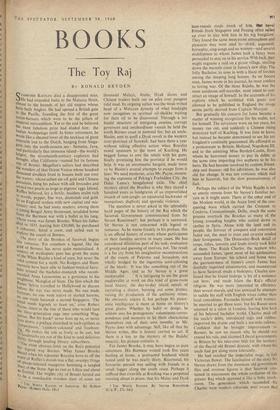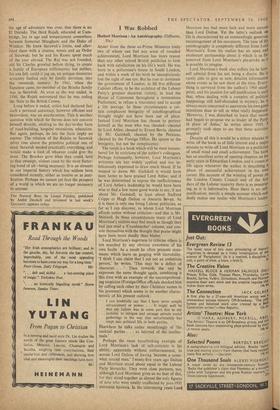BOOKS
The Toy Raj
By RONALD BRYDEN S1AMFORD RAFFLES died a disappointed man. He had extended India to the Malacca Strait, almost to the bounds of her old empire whose heirs built Angkor. He had opened a British gate to the Pacific, founding the first of the great ocean-bazaars which were to be the pillars of hhPerial mercantilism. Yet to the end he believed
the most fabulous prize had eluded him: the
Indian Archipelago itself. In bitter retirement, he Wrote like a cheated lover of the necklace of giant emeralds lost to the Dutch, hanging from Singa- pore into the south-eastern sea: Sumatra, Java, ,and Particularly that immense island—the world's largest, the seventeenth-century explorers had thought, after California—named for its famous city of Brunei. Magellan's sailors had described the wonders of that Orient Venice whose hundred thousand dwellers lived in houses built out over the waters; whose sultan ate off gold and Chinese Porcelain, hung his palace with silk brocades and owned two pearls as large as pigeons' eggs. Inland, Ittilles believed, lay a fertile, heathen realm rich In woods, pepper, fine wax, diamonds and gold. In an England restless with new capital and mis- sionary g sIcivaoaurnyzeal, he had many readers; among them
Bengal Army lieutenant, invalided home from the Burmese war with a bullet in his lung, whose name was James Brooke. When his father died in 1835, leaving him £30,000, he purchased
a schooner, hired a crew, and sailed east to explore the coasts of Borneo.
The story of the Brookes of Sarawak begins
Ii" romance. Yet somehow a legend, like the gold of Borneo, has never quite materialised. A century of mythopceic pens has given the name of.the White Rajahs a kind of aura, but never the nststedciontent for a myth. No Rodgers and Ham-
n have been able to fashion musical fairy- tales around the bachelor-monarch who recom- mended Anna Leonowens as a governess to his heighbour. Mongkut of Siam. The film which the
b ajtee Sylvia travelled to Hollywood to discuss f etore the war was never made. No one made °I.tulles, no one went native or started harems, '11_0 one made Sarawak a second Singapore. 'The prilind needs legends to feast on,' cries Robert „aYne, latest in the line of those who would turn ghee three-generation saga into something Wag- nerian. But his book* never lives up to, or never live. mown, a preface drenched in such epithets as 'Ilientpestuous,"rainbow-coloured' and 'freeboot- ,11t. He makes the tale as lively as he can; but
landmarks are not of the kind to send delicious Thrills through lending library subscribers.
t., I he most obvious limit on the Raj's potential legend was Borneo. What James Brooke utInd when his schooner Royalist hove to off the Vast of Ratfies's dream was a flat, swampy fringe tract mangrove hemming a tangled act of the Stone Age as vast as Libya and about als .1 fruitful. The mighty city of Brunei turned out It be a ramshackle wooden slum of some ten ritYne. (R W1ob 111 I. ale RAJAHS18s.) OF SARAWAK. l3y Robert ert ;RAJAHS. )OF
thousand Malays, Arabs, Dyak slaves and Chinese traders built out on piles over pungent tidal mud. Its reigning sultan was the weak-witted head of a Malayan dynasty of what hindsight now recognises as spiritual oil-sheikhs waiting for their oil to be discovered. Through a lax feudal structure of intriguing cousins, corrupt governors and insubordinate vassals he held the north Borneo coast in nominal fee; but an uncle, Hasim, sent to quell a Dyak revolt in the western river-province of Sarawak, had been there a year without taking effective action when Royalist nosed upstream to the town of Kuching. He begged James to awe the rebels with his guns, finally promising him the province if he would help. It was an unromantic bargain, made more so by Hasim's several attempts to escape from it later. We need mysteries, cries Mr. Payne, mourn- ing the exposure of Peking's Forbidden City, the Dalai Lama's bungalowed exile. The chief mystery about the Brookes is why they stayed a hundred years as landgraves of an impoverished swatch of rain-jungle, an equatorial backwater of mosquitoes, duplicity and sporadic violence.
The question is never asked in the splendidly lucid pages of the history of the Raj which the Sarawak Government commissioned from Sir Steven Runcimant; but perhaps 'it is answered. Sir Steven is not concerned with legend or romance. As he warns frankly in his preface, this is an official history of events whose participants or their families survive in many cases. He has considered discretion part of his task; evaluation of gossip and guessing of motives, not. The result is a far cry from his imaginative reconstructions of the courts of Palermo and Jerusalem, not wholly bridged by the ingenious semi-coloning of the blurb: 'It was like something out of the Middle Ages; and as Sir Steven is a great
mediaevalist . . It is intriguing to see the great medizevalist at work on this kind of grass-roots local history, the day-to-day island annals of recruiting a doctor, burning out some pirates, raising the production of the antimony mines. He obviously enjoys it, but perhaps his panor- amic intelligence is more at home on history's great plains. Whether by habit or design, he seldom uses his protagonists' voluminous corres- pondence and memoirs to let them characterise themselves out of their own mouths, as Mr. Payne does with advantage. Still, like all that Sir Steven writes, this is history carried to art. If there is a key to the mystery of the Rajahs' tenacity, his picture contains it.
For James Brooke, it may have begun as pure adventure. His Burmese wound took five years healing at home, a protracted boyhood which lasted until he was nearly thirty. Recovered, his favourite pursuit was sailing with friends in a ' small lugger along the south coast. Perhaps it sufficed that river-life at Kuching was a perpetual messing about in praus, that his Malay and Dyak
t THE WHITE ItAJAI is. By Steven (C.U.P., 27s. 6d.) host-vassals made much of him, that naval friends from Singapore and Penang often sailed up river to stay with him in his big bungalow. They found the same mess-room atmosphere and pleasures they were used to—drink, argument, horseplay, sing-songs and no women—and several midshipmen to whom James took a fancy were persuaded to stay on in his service.WithAuck, they might organise a raid on a pirate village, stealing down the moonlit coast in James's new ship, The Jolly Bachelor, to nose in with a blaze of torches among the sleeping long houses. As an honest man, James wrote in his journal, he must confess to loving war. Of the three Rajahs, he was the most assiduous self-recorder, most intent to con- struct an image of himself. In the accounts of his exploits which he scribbled with gusto and allowed to be published in England the image seems partly derived from Captain Marryat.
But gradually his concern for fame became a matter of winning recognition for -his realm, not for himself. The adventure wore on ten years, his money ran out, and suddenly a Chinese rising destroyed half of Kuching. It was time to leave, but instead he became determined to see his toy kingdom's continuity guaranteed. He offeredLit as a protectorate to Britain, Holland, Napoleon III, and to the admiring Miss Burdett-Coutts, from whom he borrowed money to pay its debts; at the same time importing two nephews to be his heirs. He had become involved by custom, friend- ship and finance; old for adventure, he was also old for change. It was not romance which tied him to Sarawak, but the slow possessiveness of fact.
Perhaps the subject of the White Rajahs is not so utterly remote from Sir Steven's familiar ter- rain as it might seem. There at the other end of the Moslem world, at the Asian limit of the con- quering wave which carried the Crescent to Cordova, Constantinople, Delhi, much the same process overtook the Brookes as many of the young crusading knights who settled down in castles in Syria. Alone with the land and its people, the fervour of conquest. and conversion faded out, the need to exist and co-exist eroded their foreignness. The Domesday-Book detail of crops, tithes, lawsuits and feuds slowly took hold of them. The Rajah Charles, the nephew who succeeded James, spent most of his adolescence away from Europe; his school and home were the garrison-mess of James's court. James had dutifully imported missionaries, and manoeuvred to have Sarawak made a bishopric. Charles con- fessed that he found bishops 'a bit of a nuisance out here,' and made Islam the Raj's official religion. He was more interested in efficiency than sexual morals, and was annoyed by attempts to saddle his staff with English wives rather than local concubines. Farouche himself with women. he married to get three sons: but his Ranee soon returned to a salon in London. leaving him lord of his beloved bachelor world. Charles paid off his uncle's debts, introduced sago and rubber, improved the drains and built a ten-mile railway. Confident that he brought improvement to Borneo, he saw no reason why he should not extend his rule, and alarmed Liberal governments in Britain by his take-over bids for the territory of the flaccid old Brunei dynasty, with whom his uncle had got along more tolerantly.
He had reached the imperialist stage, in full Victorian flower. The fascination of the story Sir Steven draws from the mundane old government files and revenue figures is that Sarawak con- tained in microcosm the whole evolution of the greater Raj which spawned it like a baby mush- Charles were modern colonials, ever aware that
Runciman. room. The generation which succeeded Sir
the age of adventure was over, that there is no El Dorado. The third Rajah, educated at Cam- bridge, lay in age and temperament somewhere between Somerset Maugham and the Duke of Windsor. He knew Sarawak's limits, and allev- iated them with a cinema, tennis and an Order of Sarawak; but he and his Ranee spent much of the year abroad. The Raj was not founded, old Sir Charles growled before dying, to create a family of European millionaires; but neither, his son felt, could it jog on, an antique miniature economy fuelled only by family devotion, into the twentieth century. In 1941, when the Japanese came, no member of the Brooke family was in Sarawak. As soon as the war ended, in 1946, the Rajah announced that he was ceding the State to the British Crown.
Long before it ended, critics had declared that such a personal autocracy, however efficient and benevolent, was an anachronism. This is another question with which Sir Steven does not concern himself directly, sticking to the day-to-day facts of road-building, hospital extensions, education. But again, perhaps, he lets the facts imply an answer. The relation of the Rajahs to Sarawak never rose above the primitive political one of need. Sarawak needed practically everything, and would make a lord of whoever could give the most. The Brookes gave what they could, held to that swampy, violent coast by the most flatter- ing bond of all—being necessary. It is an element in our imperial history which has seldom been considered recently, either as motive or as justi- fication. Perhaps we cannot yet face the prospect of a world in which we are no longer necessary to anyone.
The Natural Bent, by Lionel Fielden, published by Andre Deutsch and reviewed in last week's Spectator, appears today.











































 Previous page
Previous page